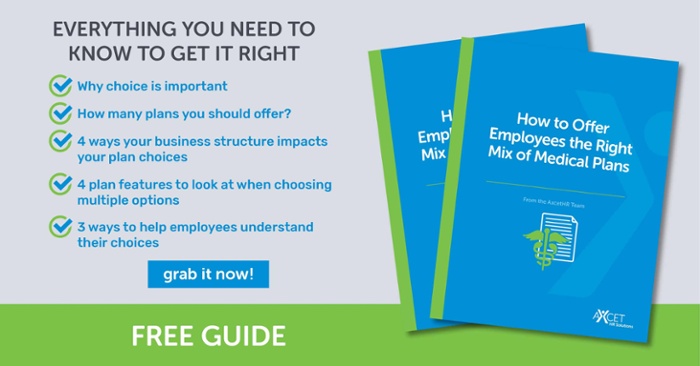By
Jeanette Coleman, SPHR & SHRM-SCP
on
Aug
07,
2019
4 min read
0 comment(s)

Small businesses with fewer than 50 full-time employees are not legally required to offer health insurance to their employees, which may explain why 38 percent of full-time employees don’t have health insurance through their employer. That said, more and more small business owners have found offering medical benefits is key when recruiting and retaining top talent, increasing employee productivity and improving job satisfaction. In fact, in a recent American Health Insurance Plans (AHIP) survey, 56 percent of American workers indicated health insurance coverage to be a key factor in their decision to stay at their current job. AHIP’s research also found an overwhelming 180 million Americans rely on employer-provided health insurance for themselves and their family.
While not offering medical benefits may save your business money in the short term, savvy business owners understand the relationship between investing in their employees’ health and wellbeing and their business’ success.
Businesses with fewer than 50 full-time employees, including full-time equivalents, aren’t subject to the employer shared responsibility provision and the employer information reporting provision for offers of minimum essential coverage under the Affordable Care Act (ACA). Employers must determine if they are an Applicable Large Employer (ALE) each calendar year based on the average amount of employees during the previous year. According to the IRS, here’s how to calculate ALE status:
According to the Employee Benefits Research Institute (EBRI), in 2016, 23 percent of employers with zero-to-10 employees provided employer-sponsored health insurance. But when looking at businesses with zero to 24 employees, that number jumped to almost half (49 percent).
The exact cost of the employer portion of health insurance will vary depending on the size of your organization and the type of coverage offered. In general, these three factors will impact cost the most:

Administering your business’ employee medical benefits plans can be tedious, especially with the complexities and costs of an ever-changing health care market. Further, as your small business approaches the 50-employee mark, compliance and reporting under the ACA can be a daunting task. Not only does partnering with a PEO bring down your employee benefits costs, but your Axcet HR Solutions dedicated human resources consultant navigates the benefits minefield for you, makes sure you’re legally compliant, manages the ever-growing paperwork and takes the headache off your shoulders. Learn more about our employee benefits management services here.
Offering medical benefits for the first time is a significant milestone for any small business. It demonstrates a commitment to your employees' well-being and can be a strategic move to attract and retain top talent. By providing health coverage, you not only enhance job satisfaction but also contribute to a more productive and engaged workforce. While the process may seem complex, partnering with experienced professionals can simplify the journey and ensure compliance with relevant regulations.
Ready to take the next step in supporting your team's health and your business's growth? Explore how Axcet HR Solutions can assist you in designing and managing effective employee benefits programs. Visit axcethr.com to learn more.
Let us know what you think...